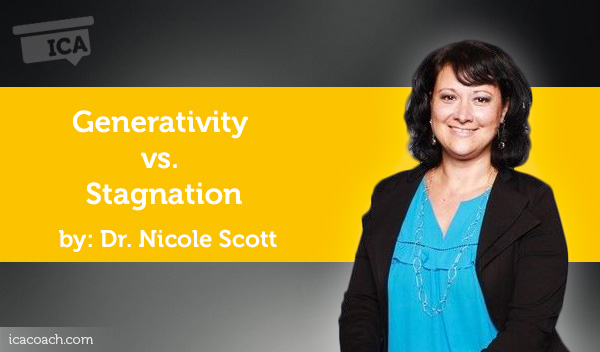
A Coaching Power Tool Created by Dr. Nicole Scott
(Business Coach & Career Transition Coach, UNITED STATES)
Application of Erikson’s Developmental Model to Business and Leadership Coaching Dr. Nicole c. Scott
According to Erikson, middle adulthood is the developmental stage of Generativity vs. Stagnation. It is during this developmental stage people are faced with questions of the meaningfulness of their contributions in life to the great whole of society. It is during this time that people who successfully navigate this stage develop the virtue of caring and develop the ability to see themselves as part of the big picture.
This stage of life is often marked by:
- Experience a “mid-life crisis.”
- Leave their parents’ homes or have their adult children leave the home.
- Are absorbed in careers and can tend to loose ties with social networks outside of the workplace.
- Working to re-establish stability.
- Face increasing reminders of their own mortality.
These life events lead to questioning the meaning in their lives and fearing meaninglessness. There is an increased drive to leave a legacy or produce something that makes a difference in the world. If people do not successfully develop through this stage, according to Erikson, they become self-absorbed and stagnate.
Generativity
Key Characteristics
Some key characteristics of generativity include
Stagnation
Key Characteristics
Some key characteristics of stagnation include
The implications for not successfully navigating the challenges of creating meaning in one’s life truly can be detrimental to the individual. Loss of social connections and friendships, lack of fulfillment in life, and failure to grow and thrive are all potential issues. By overcoming the midlife “crisis”, individuals will continue to grow and thrive through the meaningful relationships and their contributions to the greater good in the world.
Coaching Implications
During the mid-life, people begin to reflect on their lives, thus far and often begin to consider their futures and see the rest of their lives as ever increasingly finite. It is this realization that often spurs the equations of meaning and contribution to the world. Adult development theory posits that humans develop across the entire life span. It is at this point in life that people must face the challenge of making changes and adjustments in order to be satisfied with their level of personal fulfillment. A failure to adjust can result in feelings of resentment, regret and dissatisfaction with their lives. The influence these positive or negative feelings produce encroach upon and directly affect an individual’s personal and professional lives.
According to a March 2016 Forbes article, 11 key leadership traits are critical to success. These are Self-Managing, Acting Strategically, Being An Effective Communicator, Being Accountable And Responsible, Setting Clear Goals And Persisting In Achieving Them, Having A Vision For The Future, Managing Complexity, Fostering Creativity And Innovation, Team Building And Promoting Teamwork, Creating Lasting Relationships, and Learning Agility.
With so many companies struggling to find an retain high quality leaders, coaching leaders and business owners to address desires to find meaning in their work and lives; to uncover strengths talents that can be leveraged towards growing others; defining and securing their legacy.
Coaching Questions to Consider
For the Leadership or Business coach, it can be helpful to move your client’s awareness thought these types of potential questions.
- What would be different about your life if you reach your goal?
- How do you feel when you reflect on the meaningfulness of what you have accomplished so far?
- What do you believe about yourself, in relation to this situation?
In order to leverage strengths to support actions, a few questions may support an increase in self-awareness:
- Because of your unique strengths, what will be easy about this for you?
- What strengths or talents do you have right now that can help support your success in generating meaningfulness in your life?
- What learning and growth opportunities are you excited about?
- What are you thinking might be a good first step and when to you envision this first step being complete?